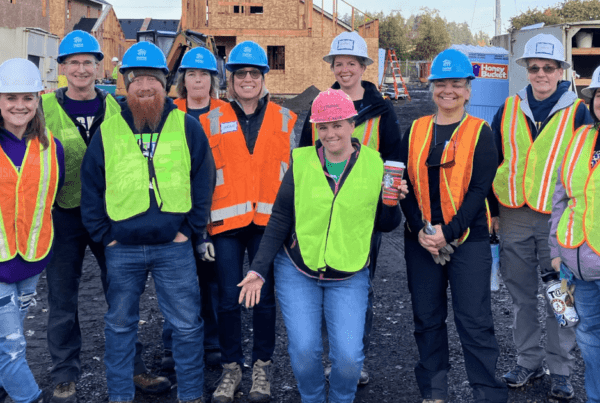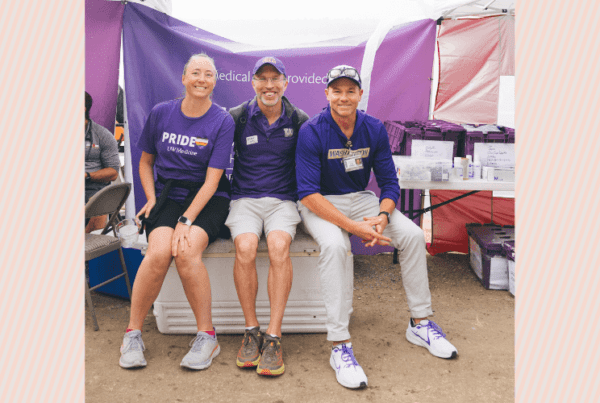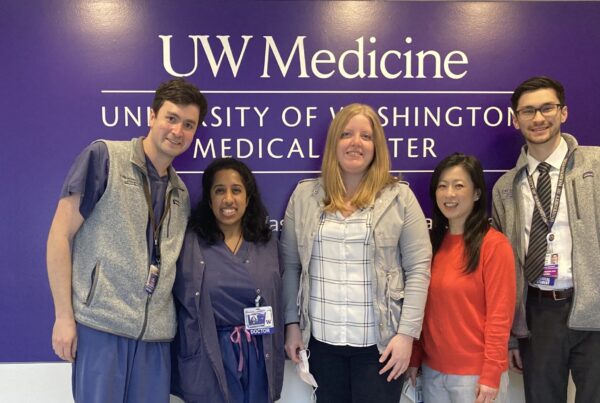As the COVID-19 pandemic unfolded in early 2020, Lisa Chew, MD, MPH, had a problem to solve.
She and her colleagues knew that COVID-19 was starkly exacerbating existing healthcare inequalities. Data indicated significantly higher hospitalization rates among communities of color and patients with limited English language proficiency.
She also knew that inadequate access to testing subsequently led to more virulent spreads of COVID-19 within already vulnerable populations.
In her roles as associate medical director of Ambulatory Care at Harborview Medical Center and an associate professor at UW School of Medicine, Chew was in the vanguard of experts rapidly developing an infrastructure to deliver medical care to the community.
Chew envisioned mobile testing units as a way to reach those in need. A similar model would be useful to distribute COVID-19 vaccinations. What she needed now was funding.
A new partnership
The urgent need for funding served as the catalyst for Chew’s inaugural partnership with UW Medicine’s Advancement team.
Advancement’s role is to identify donors who are passionate about advancing UW Medicine’s priorities and mission — a match-making process that can take months and, often, years. However, the pandemic’s exigent circumstances accelerated the process.
Advancement worked with existing UW and UW Medicine donors who saw an urgent need and wanted to help.
“There was a complete alignment of priorities and vision that flowed into success,” Chew says.
Chris Thompson, senior director for Corporate and Foundation Relations at UW Medicine, helped with efforts on Advancement’s side.
“It was an intense, all-hands-on-deck situation. We had to mobilize before there were clear answers of what lay ahead,” Thompson says. “That’s where our philanthropic community was essential and really came through for us.”
Help from the Paul G. Allen Family Foundation
Specific to Chew’s proposal for mobile testing, Thompson and the Advancement team “got on the phones and started calling anyone we thought might help.” The Paul G. Allen Family Foundation stepped up in a profound way by donating $2 million. An additional $2 million was allocated from the UW Medicine Emergency Response Fund.
Thompson credits the foundation for their adaptability and willingness to work “on the fly.” Such partnerships normally require longer courtships with ongoing meetings and discussion. In this case, groundwork was laid primarily by phone, paperwork was streamlined and the Allen Foundation remained flexible.
“The Paul G. Allen Family Foundation has a longtime relationship with UW and has been generously supportive. However, working with UW Medicine on the clinical side was somewhat new territory, yet they jumped right in,” Thompson says. “They really care and it’s a relationship we hope to continue.”
Private philanthropy was particularly important during the pandemic because donors and foundations can be nimble during times of acute need, as the foundation demonstrated during the pandemic.
“The foundation focused on supporting our underserved neighbors in the region as the impact of COVID-19 was swift and brutal,” says Lara Littlefield, director of science and technology partnerships on behalf of the Paul G. Allen Family Foundation. “We paid particular attention to the equity gap in service delivery, staying nimble and responsive to the evolving pandemic crisis.”
Thompson cites Chew’s “compelling” leadership as crucial in securing the foundation’s support. The foundation’s original emphasis was COVID-19 testing for the homeless. While that remained a focus, Chew successfully made the case for expanding the scope to include additional vulnerable populations.
“We built a network of multisector partnerships. That included the foundation as well as truly engaging with diverse communities in meaningful and culturally sensitive ways,” Chew says.
Bringing COVID-19 testing and vaccines to underserved communities
By the summer of 2020, three mobile van units were on the road and staffed by 40 to 50 UW Medicine staff and volunteers. Communities were receptive, with people often queuing in line hours before opening.
To date, more than 21,700 tests have been administered at upward of 30 sites.
In spring 2021, the foundation agreed to pivot remaining funds into mobile vaccine distribution and granted an additional $1 million to support that effort. So far, more than 7,600 vaccines have been administered via the mobile units.
The project benefited from Chew’s global direction as well as her boots-on-the-ground involvement. She regularly worked at the mobile test sites and found it personally fortifying to witness such “amazing teamwork that made me so proud.”
Over the span of a few months during spring 2020, Advancement raised more than $30 million for UW Medicine’s Emergency Response Fund to support pandemic efforts. Donors included major corporations and foundations as well as individuals.
Chew’s team worked with many new partners — schools, local governments, community centers, businesses, homeless shelters, social services and more. Post-pandemic, Chew “hopes to continue building on that outreach alongside Advancement.”
Working together toward the same mission
Chew prioritized being at the mobile sites and her partnership with Advancement allowed her to do that. Since Advancement facilitated communication with the foundation, she had more time to focus on clinical issues.
“We work with funders to distill questions, connect the right people and prepare our UW Medicine colleagues so interactions are more efficient and seamless,” Thompson says. “I do as much advance coordination and legwork as possible so people like Dr. Chew can focus on their work and donor needs are still fully addressed.”
At its heart, Advancement’s mission is to match the research endeavors, education initiatives and clinical improvements that drive our mission with private funders who want to help improve health in our community and beyond.
Chew says she was “blown away” by the support.
“What helped me through the uncertainty was being part of an incredible team working together and dedicated to doing the right thing,” Chew says. “I never felt alone.”
While she is still overseeing the COVID-19 mobile testing and vaccination units, she is finally feeling able to look further into the future.
She hopes to parlay the collaborative momentum of serving vulnerable populations during COVID-19 into long-term solutions for generally addressing ongoing and pernicious inequities in healthcare. It’s a big issue that she now feels more hopeful in tackling.
“The last year has been one of learning and growth for me. In the midst of great challenges, our partnerships demonstrated the full power of collaboration,” Chew says. “Working with Advancement is a great opportunity for UW Medicine to come together and move toward achieving amazing things.”
Guest writer: Deanna Duff


